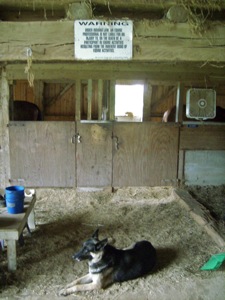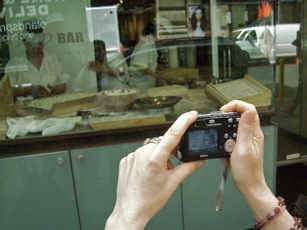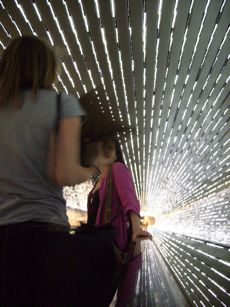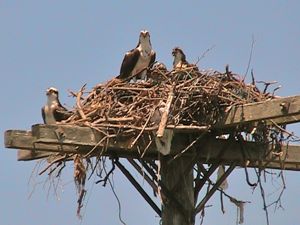The price of the motel included a full breakfast. I brought yesterday’s New York Times to read. A man with glasses and carefully combed silver hair sat at a nearby table. He was wearing a dark polo shirt and neatly pressed white shorts. He eyed my paper. “You got that at the front desk?” he said. There was just a hint of a sharp tone in his voice; he was in obvious newspaper withdrawal. “No, I got it from my car,” I said. His face fell. The only newspaper available at the motel was USA Today.
As I drove over the high point of the Taconic Hills, over the border from Connecticut into New York, a sign gave the elevation as 970 feet. Near the Pennsylvania border, we reached a high point of about 1250 feet. Then halfway across Pennsylvania, a sign told me that I had reached the highest point on Interstate 80 between the Atlantic Ocean and the Mississippi River, at about 2250 feet. Some of the scenery was spectacular, the road winding in among wooded hills and mountains that had clearly been shaped by glaciation. In many places, the road had to be cut through bedrock:
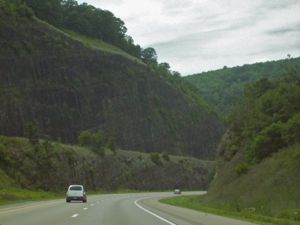
In the middle of the afternoon, I started getting fatigued. I had gone through several road construction projects where the road went to one lane, and at one point traffic had come to a complete stop due to an accident; when I passed the accident scene, they were trying to right an overturned car. I pulled into a rest area. Down behind the picnic area, a small stream wound through some woods. I walked along looking at the plants: big eastern hemlocks with young beeches pushing up around them, sassafras in the understory, and on the forest floor wintergreen, ground pine, jewel weed, trillium, all the familiar plants of the eastern woodlands. I picked a wintergreen leaf and smelled it. This would be the last of the eastern woodlands that I’ll see this year.
Towards evening, I decided to pull off the road to see if I could find a place to eat. I chose Reynoldsville, because I liked the look of countryside. It was seven miles away from the interstate, along a two-lane highway that was straight at first, then began to wind down an increasingly steep hillside, until suddenly I was on the main street of Reynoldsville. I parked the car and went for a walk. There were three or four restaurants, but they all seemed to feature pizza, except for one restaurant which promised “home cooking.” A woman was getting into her car in front of the Episcopal church. “Going for a walk?” she called out to me. “Yup, stretching my legs,” I said and smiled. Several of the houses had anti-abotion signs on their small front lawns: “Abortion stops a beating heart”; “Respect Life”; “Choose Life.” Reynoldsville did not seem like the kind of place where a middle-aged man with a pony tail would exactly fit in. I got in my car and drove back to the interstate.
Next I tried Brookville, because of a sign which mentioned the “Brookville Historic District.” When I got to Brookville, there were some impressive houses, most of which were carefully maintained. Right across from the big red courthouse with the brillian white trim, there was a little restaurant called “The Courthouse.” I would have been the youngest person there by a good twenty years. I decided that as pretty as the town was, I would not try to eat dinner there. I walked around a little bit, and came across a small manufacturing plant with a sign that said “Brookville Locomotive / Diesel Locomotives / Personnel Carriers.” This could not have been their main plant, though, for there were no railroad tracks anywhere nearby.
